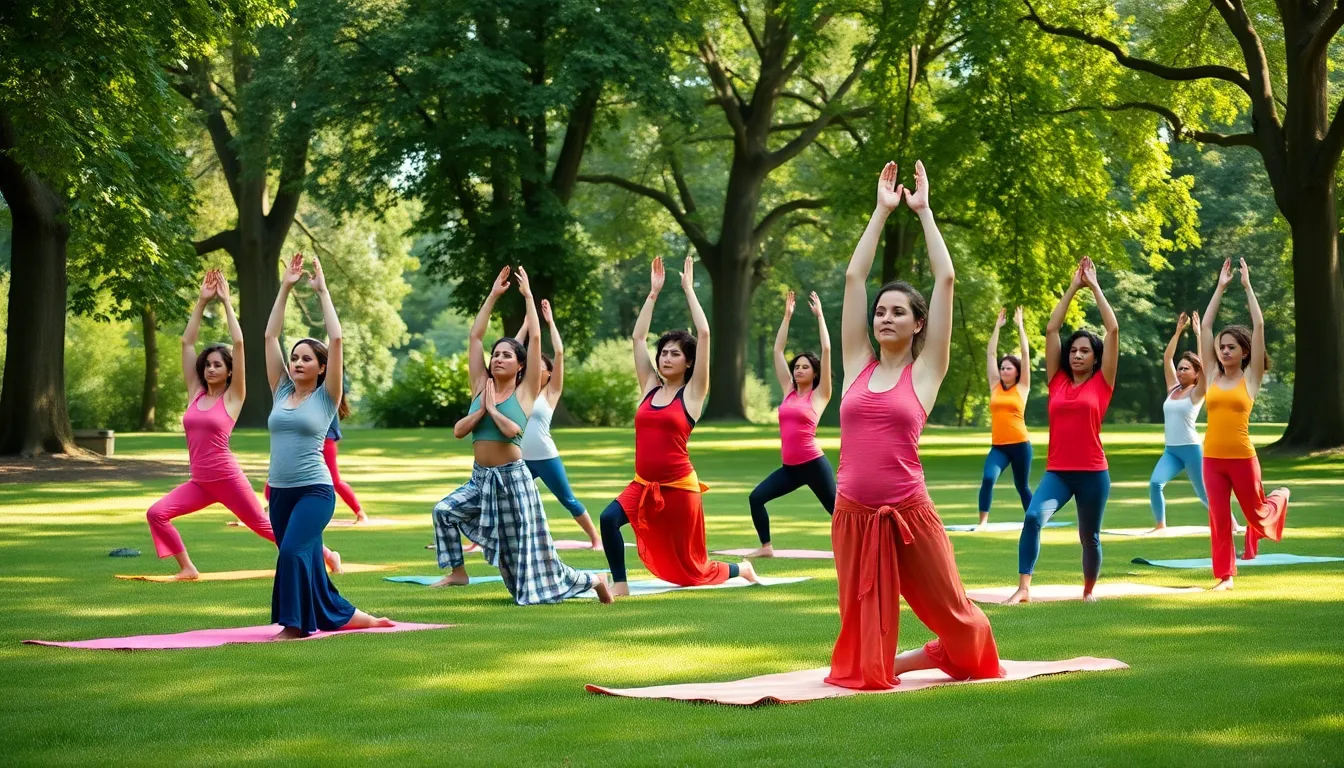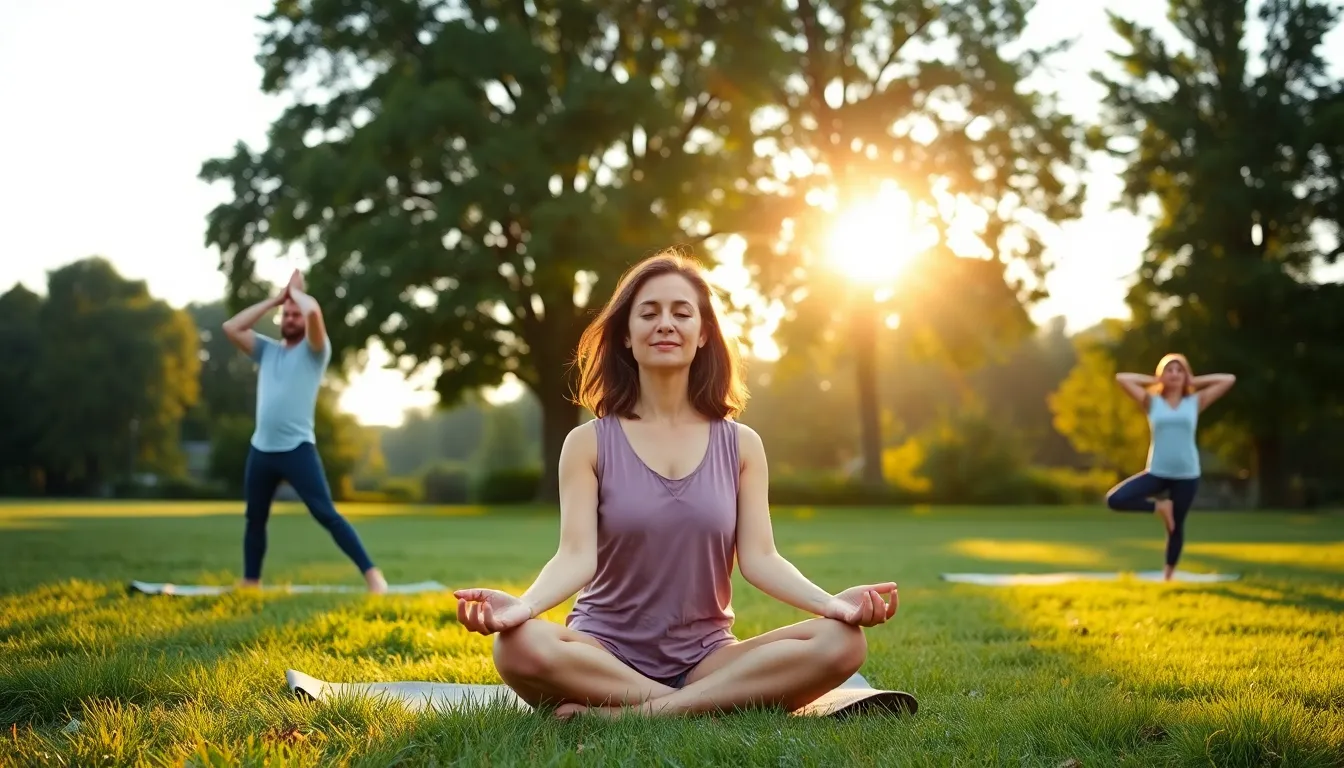Table of Contents
ToggleIn a world where stress seems to be the norm and relaxation is a rare luxury, the yoga lifestyle emerges as a beacon of hope. Imagine trading in your chaotic mornings for sun salutations and your coffee fix for a calming cup of herbal tea. Sounds dreamy, right? It’s not just about striking a pose on a mat; it’s a holistic approach to living that embraces mindfulness, balance, and a sprinkle of inner peace.
Understanding Yoga Lifestyle
A yoga lifestyle emphasizes mindfulness, balance, and well-being. This holistic approach transforms everyday living into a more peaceful and fulfilling experience.
Definition of Yoga Lifestyle
A yoga lifestyle encompasses the integration of yoga principles into daily routines. Mindfulness practices, such as meditation and breathing exercises, play a crucial role. Yoga isn’t limited to physical postures; it includes ethical principles like non-violence and truthfulness. Adopting a yoga lifestyle means prioritizing mental, emotional, and physical health through consistent practice. This lifestyle encourages individuals to cultivate awareness in thoughts, actions, and surroundings. Connecting with nature, eating nutritious foods, and engaging in community support enhance this way of living.
Benefits of Yoga Lifestyle
Adopting a yoga lifestyle offers numerous advantages. Improved mental clarity arises from regular mindfulness practices, leading to better decision-making. Emotional stability enhances interpersonal relationships and promotes compassion. Physical health benefits include increased flexibility, strength, and overall fitness. Stress reduction comes naturally as practitioners learn to manage anxiety through tailored techniques. Enhanced self-awareness fosters personal growth and resilience. Immune function improves, resulting in better overall health. Lastly, community support fosters a sense of belonging and shared values, deepening connections with others.
Key Components of Yoga Lifestyle

A yoga lifestyle integrates several essential components that contribute to overall well-being.
Physical Practices
Yoga entails a diverse range of physical practices aimed at enhancing strength, flexibility, and balance. Various styles, such as Hatha, Vinyasa, and Ashtanga, cater to different fitness levels and preferences. Regular practice fosters increased body awareness and alignment, resulting in improved posture. Many individuals notice reduced tension and pain through consistent engagement in yoga asanas. Practitioners build resilience against daily stressors, promoting better physical health.
Mindfulness and Meditation
Mindfulness and meditation are integral aspects of a yoga lifestyle. Sitting quietly and focusing on the breath allows practitioners to cultivate awareness and presence. Different techniques, like guided meditation or body scans, offer varied approaches for stress relief and emotional balance. Strengthening the mind through meditation enhances mental clarity and promotes emotional regulation. Regular practice leads to increased self-awareness and improved focus throughout daily activities.
Nutrition and Diet
Nutrition plays a critical role in supporting a yoga lifestyle. Consuming whole, plant-based foods provides the necessary nutrients for optimal physical and mental performance. Many yogis choose to follow a balanced diet rich in fruits, vegetables, whole grains, and healthy fats. Hydration is equally essential, as it maintains energy levels and aids recovery. Practitioners often explore mindful eating, fostering a deeper connection with food and promoting healthier choices.
Incorporating Yoga into Daily Life
Integrating yoga into daily life fosters tranquility amidst chaos, enhancing mental and physical well-being. Simple adjustments to routines can make a significant impact.
Morning Routines
Starting the day with yoga sets a positive tone. Incorporating sun salutations activates the body and mind. Breathing exercises help clear mental fog and invite mindfulness. Herbal tea can complement morning rituals by promoting hydration and relaxation. Engaging in 15 to 30 minutes of practice cultivates a sense of peace that lasts throughout the day. Prioritizing this time encourages residents to embrace balance and presence in their lives.
Evening Rituals
Evening rituals benefit from yoga’s calming effects. Engaging in gentle stretches can relieve tension accumulated during the day. Meditation before bed promotes a restful mind, aiding sleep quality. Practicing gratitude alongside yoga can enhance emotional well-being. Setting aside 10 to 20 minutes for these practices transforms evenings into serene spaces for reflection. Prioritizing this time helps individuals unwind, setting the stage for restorative sleep and rejuvenation.
Overcoming Challenges in Adopting a Yoga Lifestyle
Adopting a yoga lifestyle often presents various challenges. Recognizing these obstacles helps individuals move forward with their practices more effectively.
Common Obstacles
Time constraints frequently hinder the adoption of yoga. Balancing work, family responsibilities, and personal time becomes difficult. Many people experience skepticism regarding yoga’s effectiveness in addressing stress. Additionally, financial concerns can arise with class fees or purchasing equipment. Inconsistent motivation can also prevent individuals from establishing a routine. Without clear support, integrating yoga into daily life may feel overwhelming.
Strategies for Success
Establishing a consistent routine can significantly enhance commitment to yoga. Setting aside specific times each day for practice fosters a sense of discipline. Incorporating short sessions, like 10-minute stretches, makes yoga more accessible. Seeking online resources or community classes reduces financial burdens. Connecting with like-minded individuals offers support and encouragement. Setting realistic goals allows gradual progress without overwhelming stress. Practicing mindfulness in other daily activities reinforces the yoga lifestyle throughout the day. Each small step contributes to a more balanced and peaceful life.
Embracing a yoga lifestyle can lead to profound changes in one’s daily experience. By integrating mindfulness and holistic practices, individuals can navigate life’s challenges with greater ease. The journey toward balance and inner peace doesn’t require perfection; rather, it thrives on consistent effort and a willingness to adapt.
Small adjustments in daily routines can yield significant benefits. Whether it’s starting the day with sun salutations or winding down with meditation, each practice contributes to overall well-being. As individuals cultivate these habits, they’ll likely discover a deeper connection to themselves and their surroundings.
Ultimately, the yoga lifestyle offers a pathway to enhanced mental clarity, emotional stability, and physical health. With dedication and support, anyone can transform their life into a more serene and fulfilling journey.




